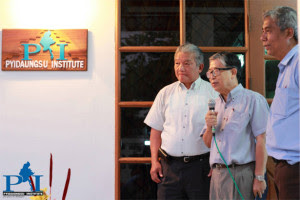A new research centre, called the Pyi Duang Su Institute for Peace and Dialogue (PI), opened in Chiang Mai this week with the aim of providing “technical assistance” to stakeholders in the peace process, said PI’s director in an interview with Karen News.
 Kheun Sai Jaiyen, PI’s director and an editor at the Shan Herald Agency for News (S.H.A.N), said that PI would offer a “bridge over troubled waters.”
Kheun Sai Jaiyen, PI’s director and an editor at the Shan Herald Agency for News (S.H.A.N), said that PI would offer a “bridge over troubled waters.”
Kheun Sai Jaiyen added that PI was the ethnic groups answer to the Burma government backed Myanmar Peace Centre (MPC), while stressing that PI would work together with the MPC.
“We would like to be a bridge between hardliners and moderates, conservatives and liberals… We will work together, but ethnic groups must have our own [peace institute]… PI will be serving all of the ethnic organisations and the people of Burma.”
The initial purpose of PI had been to research the 19 topics that formed part of the ceasefire agreements signed by the ethnic armed organizations and Burma’s government, including land rights, constitutional reform and human rights.
Kheun Sai said that PI had already provided technical assistance to the United Nationalities Federal Council (UNFC) – a coalition of 11 ethnic armed organizations including the Karen National Union – in a November peace talks meeting between the group and Burma’s government.
“The ethnic groups including the UNFC need technical assistance from outside, so that is what PI is attempting to provide. We did so in November, where a deadlock in negotiations had been reached. So we proposed a single document method for the negotiations, rather than each party having their own document. It had five columns, the National Ceasefire Coordination Team (NCCT) position (representing 16 ethnic groups), the government position, common positions of both parties, disagreements and possible solutions,” he said. “We discovered that the government and ethnic groups agreed on 50% of the issues, which was a positive step. Before they would only look at differences not at what they agreed to,” he added.
Kheun Sai claimed that PI would provide some newfound balance to the peace process. “The purpose of PI is to encourage peace and dialogue. At the moment we have only dialogue but no peace. The government side act like they want peace but do not want dialogue.”
Karen News can confirm that the Europe Burma Office (EBO) will fund PI for at least three years – the amount of money being provided, however, was not disclosed.
Khuen Sai maintained that his role, as both PI’s director and an editor of S.H.A.N, did not present a conflict of interest. “I only write for them [S.H.A.N] if they don’t like what I write they don’t have to publish it.”
Khuen Sai stressed SHAN independence was compromised by his position with PI.
“The Shan Herald s still independent from EBO and the PI is a completely independent organization. We are still independent. Everything you must say or write must not only be true but also serve the peace process. I go by advice from the Buddha who said: I only say what is true, beneficial and pleasing and also what is true, beneficial and displeasing.”
According to an article on S.H.A.N’s website, PI had 17 researchers, including “independents, and members of CSOs and armed organizations.”



